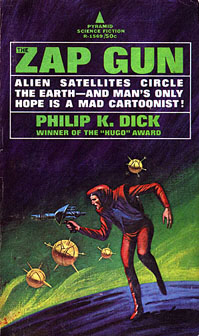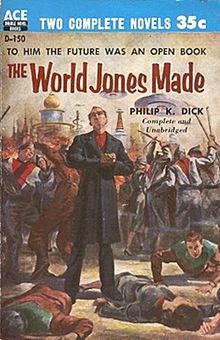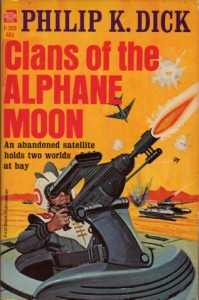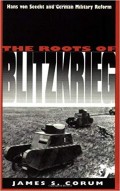Three-Book Review of Philip K. Dick's: The Zap Gun; The World Jones Made; and Clans of the Alphane Moon

The Zap Gun
First up is Philip K. Dick's The Zap Gun. The version I have used is a Vintage Books paperback. (Vintage Books is a division of Random House, Inc., in New York). The first Vintage Book edition was put out in November of 2002. The book was originally published in 1965 by the Galaxy Publishing Corporation. The book runs approximately 243 pages.
From the back cover
"Scaldingly sarcastic yet enduringly empathetic, The Zap Gun is Dick's remarkable novel depicting the insanity of the arms race. Lars Powderdry and Lilo Topchev are counterpart weapons fashion designers for a world divided into two factions --- Wes-bloc and Peep-East. Since the Plowshare Protocols of 2002, their job has been to invent elaborate weapons that only seem massively lethal. But when alien satellites hostile to both sides appear in the sky, the two are brought together in the dire hope that they can create a weapon to save the world, a task made all the more difficult by Lars falling in love with Lilo even as he knows she's trying to kill him."
You know what this book reminds me of, a little bit? It reminds me of an episode of The Simpsons. I'm thinking of one of the Halloween special episode, which has a skit called "Monkey's Paw," or something like that. The paw grants wishes.
Lisa used the paw to wish for "world peace." This wish is granted; and since there is no more war, swords are indeed "beaten into ploughshares." Unfortunately, this leaves the Earth defenseless when giant alien, sentient squid invade the planet.
Someone else gets his hands on the magical paw---I forget who it was---and wishes that the world go back to its previous warlike state. At that we see Mo the bartender running off the alien squids with a plank with a nail sticking out of it.
In The Zap Gun swords have been beaten into ploughshares alright. But they have been render as such in a most interesting way. An alien invasion takes place which requires that the "ploughshares" be turned by into swords... well, in a way. And when this happens the aliens are, indeed, successfully driven off.
Now, in this particular world that Philip K. Dick has created, a double move has been worked on the public at large. There has been disarmament under the cover of non-disarmament.
Did you get that? There has been real, meaningful, just about total de-weapon-ization of both sides, Wes-bloc and Peep-East (read: United States and western allies and the Soviet Union).
But this real, meaningful, just about total de-weapon-ization has occurred, while both sides pretend that nothing has changed.
You see, that menacing anti-tank rocket launcher only looks like a menacing anti-tank rocket launcher; its really more useful as a blender. But whatever you do, you mustn't tell the "pursaps" that!
Pursap = pure + sap. The pure saps. The term, "pursap," then, refers to the public.
You see, the powers-that-be do not think that John Q. Public would be satisfied with world peace. So both governments, West-bloc and Peep-East put on a constant advertising and marketing extravaganza to convince the "pursaps" that the arms race is still going on.
One of the characters explained the reasoning like this: He said that if the pursaps did not see such weapons, they would imagine that they existed anyway. This unseen nature of the weapons would create a paranoid reaction in the minds of the public.
The pure saps---US---would then start thinking that these terrifying, yet unseen weapons would be turned on them. Why? Maybe they were late with a utility bill. Maybe they improperly avoided jury duty. Maybe they took home unauthorized office supplies. Maybe they voted for Bernie Sanders. Whatever.
Advertising skits are put on to show the public that these supposed "weapons" are being put to good use. Human-looking androids (or "simulacra"), depicted as criminals or "enemies," appear to succumb to their awesome might.
Now then, as the pursaps see the "weapons" in action, their minds are put at ease. They think that these weapons will not be turned on them, after all; because there appears to be an abundance of "bad" people or "enemies" that need to be eradicated.
I'm not going to go on and on about this. I will only say that this is a reminder to ask ourselves who the audience is for a politician's words, at any given moment.
For example, those of you old enough to remember Ronald Reagan's eight years in the White House, may recall that he advocated a missile shield called SDI, Strategic Defense Initiative or Star Wars. A lot of people thought the notion was absurd in its unworkability.
But we might ask ourselves: Was the talk about "Star Wars" just for the benefit of the American public, to convince us that the government was vigorously protecting us? Was it ever meant to be a serious thing?
Remember the "arms race" that the United States and the Soviet Union were engaged in. When Communism collapsed, it was later revealed that it had never really been much of an "arms race," after all.
The Soviet Union never had any hope of matching American military spending, especially on automated systems. The Soviet Union had a third-rate economy and crumbling infrastructure. But the Soviet leadership talked a good game for as long as they could, for the benefit of the Soviet masses.
What about torture?
Is "enhanced interrogation" effective in getting cooperation from terrorist suspects, or not?
You know, there's a saying that goes something like this: The technique of infamy is to invent two lies and get people arguing over which one is true.
You have Dick Cheney on one side, talking about how many American lives were saved by going into "the shadow side," with "enhanced interrogation" techniques. And you have his liberal critics on the other side, talking about how creating bonds of empathy are the best way to get a suspect to open up.
Blah, blah, blah! As far as we the people see, our leaders---while they may disagree---are concerned with the best way to get live-saving information to protect American citizens.
The thing is that torture can be a way of sending information, or sending out a generalized warning, like Nixon's so-called "madman" theory of global politics.
If the goal is to send a warming, we're talking about empire. If the goal really is the collection of information, we're, hopefully, still talking about a republic.
If the goal is the defeat of "terrorism," we're talking about empire. If the goal is apprehension of specific criminals, we're, hopefully, still talking about a republic.

The World Jones Made
The version I used was put out by Vintage Books (a division of Random House, Inc., New York). The first Vintage Books edition was put out in July of 1993. The novel was originally published under the copyright of A.A. Wyn, Inc., in 1956. The book runs about 196 pages.
From the back cover
"Floyd Jones is sullen, ungainly, and quite possibly mad, but in a very short time he will rise from telling fortunes at a mutant carnival to convulsing an entire planet. For although Jones has the power to see the future --- a power that makes his life a torment --- his real gift lies elsewhere: in a world where dreaming has been made illegal, even when the dream is indistinguishable from a nightmare.
"In Philip K. Dick's unsettling chronicle of the rise and fall of a postnuclear messiah, readers will find a novel that is minutely realistic as it is prophetic. For along with its engineered mutants, hermaphroditic sex performers, and protoplasmic drifters from the stars, The World Jones Made gives us nothing less than a deadly accurate reading for our own hunger for belief."
You know what this novel reminds me of, a little bit? If you are familiar with Stephen King's novel, The Dead Zone, as well of the movie adaptation of the same name, you may feel echoes of that if you read Philip K. Dick's The World Jones Made.
Those of you familiar with Mr. King's novel, remember the two characters of the paranormal with the power to see into the future, and the ruthless, even evil politician who hopes to scheme his way to ultimate power---the presidency of the United States of America.
I find it interesting to compare and contrast those two novels. For one thing, as you know, Stephen King was and is a "horror" fiction writer, primarily; and Mr. Dick was a "dark comedy" science fiction writer, primarily.
When I call Philip K. Dick a "dark comedy" writer here is what I mean: He usually wrote deadly serious novels---and I mean deadly serious---that were fuelled by pretty wacky and absurd premises. I often say that the "science fiction" apparatus he used was, in many ways, just a launching pad to propel the reader into the metaphysical ideas that really interested him.
Philip K. Dick called himself a "fictionalizing philosopher," rather than a novelist, per se. It just so happened that science fiction gave him the best literary platform to explore the kind of ideas that kept him up nights.
Now, in this Philip K. Dick novel, The World Jones Made, the characters of the future-seeing paranormal and the evil politician were merged into a single character, Floyd Jones. Jones is both the psychic and the evil politician.
Now, I need to say this.
One of the marvelous things about Philip K. Dick as a writer and/or "fictionalizing philosopher," as the case may have been, was the fact that he had, literally, creativity to spare. This is not an observation unique to myself. It has been remarked, more than once, that Philip K. Dick would casually toss off mind-blowing ideas in a paragraph or two---that most other writers might hungrily seize upon to write novels with---and just move on, apparently forgetting about them.
As director Robert Rodriguez said of Quentin Tarantino---as the former interviewed the latter---it was like that scene in The Three Amigos with Steve Martin and Chevy Chase. Its the scene when Chevy Chase is drinking from a canteen full of water in the desert; and the other two "amigos" are looking on in longing.
There in the desert. Yet Chevy Chase's character is so unconcerned with where his next sip of water is going to come from, that he actually pours some of the water out of his canteen onto the desert ground.
Anyway, Floyd Jones foretells the future in an interesting way. He is not just a "precog," as Philip K. Dick calls such paranormals in his fiction. Floyd Jones can tell the future a full year in advance. He knows all that will happen in those 365 days of that next year.
For example, today is March 21, 2016. Floyd Jones can tell the future covering from March 22, 2016 to March 22, 2017.
Today is March 21, 2016.
Floyd Jones can tell what happens in the next 365 days in a way that is different from the way that Philip K. Dick's "precogs" do it.
Today is March 21, 2016. Floyd Jones can tell you what will happen from March 22, 2016 to March 22, 2017 because, for him, that next year will have already happened!
For Floyd Jones, that next year will have already happened. You see, Floyd Jones will actually experience or live through that next year before everybody else in the world does; so that when everybody else experiences those 12 months for the first time, Floyd Jones will be experiencing or living through them for the second time.
The story explains that Floyd Jones has been subject to this strange modality of existence, literally, since before he was born. Indeed, this is how he had learned to talk, read and write so early in his childhood. You see he had already been born into the world and experienced these things before he had been born into the world to, apparently, experience these things "for the first time."
I mention this to tell you that Hinduism, with its focus on reincarnation, has a strong influence on the fiction of Philip K. Dick. You see, when Floyd Jones "foretells" the future, it almost isn't fair because what he is actually doing is "simply" recalling what he has already experienced.
Another reason I mention this is to draw your attention to how The Dead Zone ended. I'm talking about the film, as I have not read the novel yet. In the film starring Christopher Walken (psychic) and Martin Sheen (evil politician).
The film ends with a political rally, at which a gunman tries to kill Sheen. Martin Sheen's character attempts to use a little boy as a human shield. It is this disgusting cowardice which ruins Sheen. When that picture hits all the papers, the evil politician will be finished. Walken's character is actually slain by the gunman.
I suppose you could say that Walken "had the last laugh," as it were.
But in The World Jones Made, remember the evil politician and the paranormal are merged. Floyd Jones has an antagonist in the story.
What is interesting about the fate of Floyd Jones, as compared to the paranormal and the evil politician in The Dead Zone is this:
1. The evil politician, Jones, faced ruin but for a different reason: an alien invasion that he could "see" no way to avert or effectively resist.
2. The public at large will be prevented from learning of the "evil" of the politician Jones because the psychic Jones will successfully manipulate his antagonist into making a sainted martyr of Jones, who will come off looking something like Abraham Lincoln, a hero struck down.
Let's move on to the last review.

Clans of the Alphane Moon
And last but certainly not least is Philip K. Dick's Clans of the Alphane Moon. This paperback was also published by Vintage Books (a division of Random House, Inc., in New York). The first Vintage Books edition was published in May of 2002. The novel was originally published under the copyright of Ace Books, Inc., in 1964. The book runs about 247 pages.
From the back cover
"When CIA agent Chuck Rittersdorf and his psychiatrist wife, Mary, file for divorce, they have no idea that in a few weeks they'll be shooting it out on Alpha III M2, the distant moon ruled by various psychotics liberated from a mental ward. Nor do they suspect that Chuck's new employer, the famous TV comedian Bunny Hentman, will also be there aiming his own laser gun. How things came to such a darkly hilarious pass is the subject of Clans of the Alphane Moon, an astute, shrewd, and acerbic tale that blurs all conventional distinctions between sanity and madness."
One of Philip K. Dick's thematic concerns seem to have been sanity and insanity. What is sanity? What is insanity? Can the difference between those states of mind depend upon cultural context? That is to say, can a person who is insane in one society, be sane in another kind of society?
Not guilty by reason of insanity
As you know, this means that he did the crime, but did not appreciate the consequences for the person against whom he had committed it.
There was an infamous case in a Texas death row ward. There was an intellectually challenged young man, who was slated for execution. He was given a last meal. When he was asked why he wasn't eating his desert, the prisoner said that he wanted to save it for "later."
The prisoner clearly could not appreciate the fact that the consequences of that lethal injection the authorities would give him, would be that he could not have his desert "later."
So perhaps we can define insanity as the inability of a person to grasp the consequences, for others, of his extreme actions. So, in the case of the young death row prisoner, who wanted to save his desert for "later," because he could not appreciate the finality of the lethal injection the state would give him---actual insanity might prevail because he similarly might have been unable to appreciate the permanence of his murderous act(s). That is to say, he may have thought that the person he slew could "eat his desert later."
I understand that actual insanity, "temporary" or otherwise, is very hard to prove in a criminal trial.
If you really believe that you can kill a person and that he will come back to life to eat his desert "later," than we can say that you are a person, for whom the inhibition to kill has been truly shut down; or perhaps the inhibition against murder was never actually activated.
This is different, in my opinion, than the so-called psychopath or sociopath. I understand that such creatures feel no empathy. But we are also given to understand that these creatures are often very intelligent and can be quite charming. They are skilled fakers. They are good at faking emotions they are said not to feel.
Okay, let's say that is true. Let us say that the sociopath does not feel the inhibition to murder, and can only fake it. In my opinion that makes him sane. To my way of thinking, it is enough that he knows of the existence in society, of the prohibition against murder. What he personally "feels" is another, largely irrelevant matter.
The young man on death row, I've been talking about, apparently not only did not personally feel the inhibition to murder human beings, and he also did not even know of the existence, in society, of the prohibition against the murder of human beings. He could, in no way, identify with the inhibition to murder.
The sociopath, regardless of his "feelings," could intellectually identify with the societal prohibition on murder. Therefore he is sane because he does have the means to stop himself from killing, because regardless of what he "feels," he knows that society thinks it is a bad thing.
As Columbo would say, "Ah, one more thing"
We are defining insanity like this: It is a state of mind by which a person commits an extreme act, on a continual and ongoing basis, without any understanding of the acts negative consequences for others.
This means that someone can be "insane" in one way but otherwise "sane." That is to say, a person can have one area which is his personal blind spot---he commits an extreme act without any awareness of negative consequences for others---while being sane in every other way; that is he does not commit extreme acts without awareness of their negative consequences for others OUTSIDE OF HIS OWN PARTICULAR, PERSONAL BLINDSPOT.
Are you following me? Here comes the reason I mention all of this
The Clans of the Alphane Moon are these:
1. The Pare clan, for paranoid schizophrenics
2. The Manses clan for the manic-depressive types, characterized by constant manifestations of extreme hostility toward the outer world; as well as hyperactivity.
3. The Dep clan for depressives.
4. The Ob-Com clan for obsessive compulsives
5. The Heeb clan for the hebephrenic. The dictionary definition we are given is: a form of schizophrenia characterized especially by incoherence, delusions lacking an underlying theme, and affect that is usually flat, inappropriate, or silly.
The way the word is used in the story also seems to mean: extremely messy and sloppy. It is used to connote "hoarding."
6. The Skitz clan for the schizophrenics, the non-paranoid variety.
7. The Poly clan for "polymorphic schizophrenia simplex."
Its worth noting how the story's psychiatrist, Mary Rittersdorf, understands the clans. The Heebs, "a corruption of the obviously accurate diagnostic category hebephrenic--gazed with vacuous silliness, grinning without comprehension, even without real curiousity" (page 93).
Interestingly, she accuses her own husband, Chuck Rittersdorf, the CIA agent, of having a personality with a hebephrenic tendency. According to her, her husband "has a latent streak of hebephrenia in him... he has always shrank from socio-sexual responsibility..." (ibid).
But at least the Heebs are harmless, in the good doctor's professional opinion. The manic-depressives were frightful specimens, "who, in their manic phase, could be highly destructive" (page 94).
Of course there is a "more sinister category." The manics were destructive only by impulse. "However, with the acute paranoid a systemized and permanent hostility could be anticipated; it would not abate in time but on the contrary would become more elaborate. The paranoid possessed analytical, calculating quality; he had a good reason for his actions, and each move fitted in as part of the scheme. His hostility might be less conspicuously violent... but in the long run its durability posed deeper implications as far as therapy went. Because with these people, the advanced paranoids, cure or even temporary insight was virtually impossible. Like the hebephrenic, the paranoid had found a stable and permanent maladjustment" (ibid).
Now, I'm skipping a few steps because this essay has already run rather long. But on of the questions that Philip K. Dick examined was: What is sanity and insanity? as I have mentioned.
Can the "insane" be rendered "sane" under the right circumstances? Dr. Rittersdorf's answer to that question is no; but consider the way she, herself, theorizes the clans coming together as a workable civilization.
"Yes." She nodded. "the paranoids---actually paranoiac schizophrenics---would function as the statesmen class; they'd be in charge of developing political ideology and social programs--they'd have the overall world view. The simple schizophrenics..." She pondered. "They'd correspond to the poet class, although some of them would be religious visionaries---as would some of the Heebs. The Heebs, however, would be inclined to produce ascetic saints, whereas the schizophrenics would produce dogmatists. Those with polymorphic schizophrenia simplex would be the creative members of the society, producing new ideas" (page 95).
The good doctor added: "There could be some with over-valent ideas, psychotic disorders that were advanced forms of milder obsessive-compulsive neurosis, the so-called diencephalic disturbances. These people would be the clerks and office holders of the society, the ritualistic functionaries, with no original ideas. Their conservatism would balance the radical quality of the polymorphic schizophrenics and give the society stability" (pages 95-96).
Her conception is a caste set up as in ancient India. The Heeb clan, by the way, "would be equivalent to the untouchables," (relegated to all the dirtiest manual labor). "The manics would be the warrior class, without fear; one of the highest," said Dr. Rittersdorf (page 95).
Question: If the very "insanity" of the clans constitutes the necessary building blocks of a viable civilization, are they still "insane"?
Suppose an allegedly "sane" person like, say, Dr. Mary Rittersdorf of Earth (Terra), is compelled to live on the Alphane Moon with the clans. Suppose she had to pick a clan to join by identifying the general drift of her otherwise "sane" personality. Meaning she had to pick a clan to identify with.
Political expediency causes this remarkable loop: Dr. Rittersdorf must, in effect, render herself "insane," by "normal" Terran standards, thus joining the tribe of former mental patients; and then by finding her place within this brand new, growing society where each previous "dysfunction," provides the fuel for the civilization---she, in essence, re-normalizes herself, renders herself once again "sane."
Do you follow me?
Okay, that's enough!
Thank you so much for reading!







